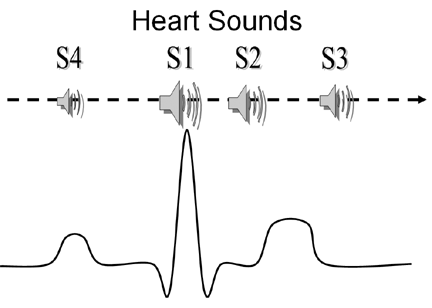Heart Sounds definition

What is Heart Sounds and Definiton
Heart Sounds - the sounds of the opening and closing of the heart’s valves and the passage of BLOOD through them. HEART sounds are an important component of physical diagnosis for cardiovascular conditions. Doctors listen to them using a STETHOSCOPE.
Heart Sounds: S1, S2, S3, S4
The classic lubb dupp sounds are the normal heart sounds in a healthy adult. These are the first and second heart sounds, designated S1 and S2. S1 represents the closing of the tricuspid and mitral valves between the atria and the ventricles. S2 represents the closing of the pulmonary and aortic valves as blood leaves the right and left ventricles, respectively. Other heart sounds are abnormal in adults, occurring only with certain health (and usually heart) conditions. They include
- S3, sometimes called a pericardial knock, indicates a dilated ventricle and ventricular dysfunction such as may occur with CARDIOMYOPATHY (though S3 may be a normal heart sound in young children) or HEART FAILURE. S3 is a lowpitched, vibrational sound the doctor can hear using the bell of the stethoscope.
- S4, indicates abnormal MUSCLE tissue in the heart such as might occur with MYOCARDIAL INFARCTION or hypertrophic cardiomyopathy. S4 also may occur with ISCHEMIC HEART DISEASE (IHD) and HYPERTENSION. Like S3, S4 is a lowpitched vibration the doctor hears with the bell of the stethoscope.
- A click is a high-pitched tone following S1 that indicates improper closing of a valve such as might occur with AORTIC STENOSIS or pulmonary artery stenosis, particularly when these conditions are congenital.
- A snap is a sharp sound following S2 that is typical with mitral stenosis.
- A murmur is a whooshing or whispering sort of sound that indicates blood flowing back through an incompletely closed valve. The timing and quality of the murmur’s sound help determine which valve is dysfunctional. Heart murmurs are common and often have no cardiovascular significance, though persistent murmurs may indicate VALVULAR HEART DISEASE.
The cardiologist may choose to further investigate persistent abnormal heart sounds using ELECTROCARDIOGRAM (ECG), ECHOCARDIOGRAM, and other diagnostic procedures depending on the person’s symptoms and cardiovascular history.
See also AUSCULTATION; CONGENITAL HEART DISEASE; HEART MURMUR.